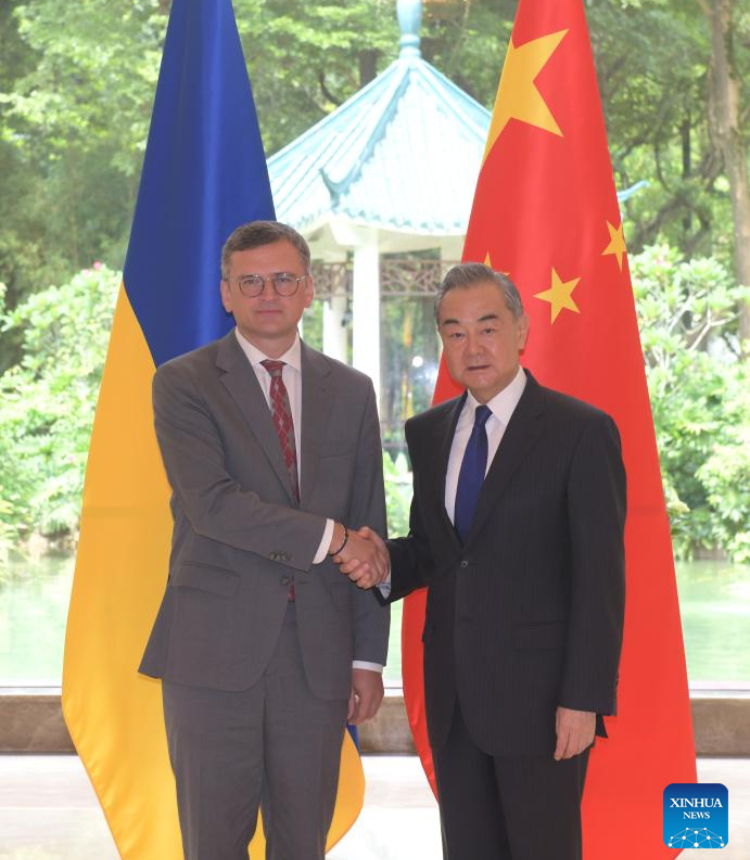Slanders against China over Ukraine crisis fall apart on their own: Global Times editorial

Chinese Foreign Minister Wang Yi held talks with Ukrainian Foreign Minister Dmytro Kuleba in the southern Chinese city of Guangzhou on Wednesday. The Ukraine crisis has entered its third year, with the conflict ongoing and risks of escalation and spillover still present. As the highest-ranking Ukrainian official to visit China since the outbreak of the conflict, the discussions and the signals sent during the talks, as well as whether there are signs of peace in the Russia-Ukraine conflict, have garnered international attention. Particularly in light of China's successful mediation efforts in re-establishing diplomatic relations between Saudi Arabia and Iran, and promoting internal reconciliation of Palestine, there are heightened expectations for China's constructive role in promoting peace talks in the Russia-Ukraine issue.
As part of China's recent diplomatic efforts to mediate international and regional hotspots, China's proactive invitation to Kuleba to visit has garnered international attention. According to Reuters, citing Ukrainian accompanying officials, the talk lasted over three hours, longer than planned, and was "very deep and concentrated." The word "deep" is rarely used in diplomatic settings. In a statement after the meeting, the Ukrainian side stated, "China's role as a global force for peace is important." This reaffirms China's role as a peacemaker and highlights the effectiveness of the meeting.
As a direct party to the Russia-Ukraine conflict, Ukraine has shown greater interest in China's positions than before. This has led international public opinion to maintain cautiously optimistic about the direction of the Russia-Ukraine issue and to pay more attention to China's role in major regional conflicts. Even Western media, which often distorted and smeared China's stance on the Russia-Ukraine issue, is now speculating whether China intends to preempt the US in playing the role of peacemaker. These discussions in various directions all confirm that China's efforts to promote peace are increasingly prominent and have become an acknowledged reality in the international community.
The distortions and slanders against China by the West have largely fallen apart on their own. The fairness of China's position has been once again validated, and China's proposals have withstood the test of time. Western efforts to stoke the fire have only prolonged the conflict. Ukrainian President Volodymyr Zelensky stated in a recent interview, "We have to finish the war as soon as possible." More and more signs point to the fact that the resolution of all conflicts will ultimately return to the negotiating table; all disputes will eventually be resolved through political means. This is precisely what China has consistently advocated.
From the handshake between Saudi Arabia and Iran, to the historic reconciliation within Palestine, to the complex and challenging Ukraine crisis, why does China's position repeatedly manage to gather the broadest consensus in the international community? First, it is because China maintains an objective and fair stance and is committed to mediation and promoting dialogue. Second, China adheres to the concept of common, comprehensive, cooperative, and sustainable security, working tirelessly to maintain world peace, stability, and development. In the face of crises, China does not stoke the flames or take advantage of the situation for its own gain. This stance is visible to the international community and the parties involved in the conflict.
There is an Arabic proverb: "Seek knowledge, even if you have to go as far as China." Now, the saying "Seek peace in China" is also becoming popular. On the complex international stage, China's role as a responsible major power maintaining world peace is increasingly recognized. As China called for in the Global Security Initiative Concept Paper in 2023, "countries need to work in solidarity to foster a community of shared security for mankind and build a world that is free from fear and enjoys universal security." China's stance is clear and consistent: between peace and war, it chooses peace; between dialogue and sanctions, it chooses dialogue; between cooling down and fueling the fire, it chooses cooling down. On the Ukraine crisis, China remains straightforward and sincere, without political self-interest or geopolitical manipulation. China is truly dedicated to mediation and promoting dialogue to achieve a cease-fire and an end to the conflict.
Of course, the Ukraine crisis did not form overnight, and resolving the issue will not be accomplished in a single step. It requires the joint efforts of the international community. Recently, US Secretary of State Antony Blinken once again claimed at the Aspen Security Forum that "China can't have it both ways." Many in the West remain stuck in the mindset of "supporting one side," which only complicates and intensifies the conflict. Influential major countries, in particular, should align with China to create conditions and provide support for direct dialogue and negotiations between Russia and Ukraine. Only when major powers contribute positive energy rather than negative energy can there be an early glimpse of a cease-fire in this conflict.